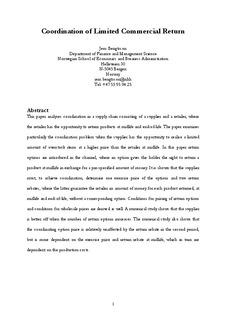| dc.description.abstract | This paper analyses coordination in a supply chain consisting of a supplier and a retailer, where the retailer has the opportunity to return products at midlife and end-of-life. The paper examines particularly the coordination problem when the supplier has the opportunity to realise a limited amount of overstock items at a higher price than the retailer at midlife. In this paper return options are introduced in the channel, where an option gives the holder the right to return a product at midlife in exchange for a pre-specified amount of money. It is shown that the supplier must, to achieve coordination, determine one exercise price of the options and two return rebates, where the latter guarantee the retailer an amount of money for each product returned, at midlife and end-of-life, without a corresponding option. Conditions for pricing of return options and conditions for wholesale prices are derived as well. A numerical study shows that the supplier is better off when the number of return options increases. The numerical study also shows that the coordinating option price is relatively unaffected by the return rebate in the second period, but is more dependent on the exercise price and return rebate at midlife, which in turn are dependent on the production costs. | en |
